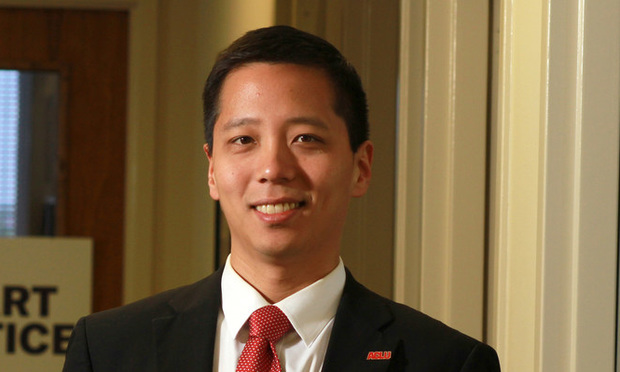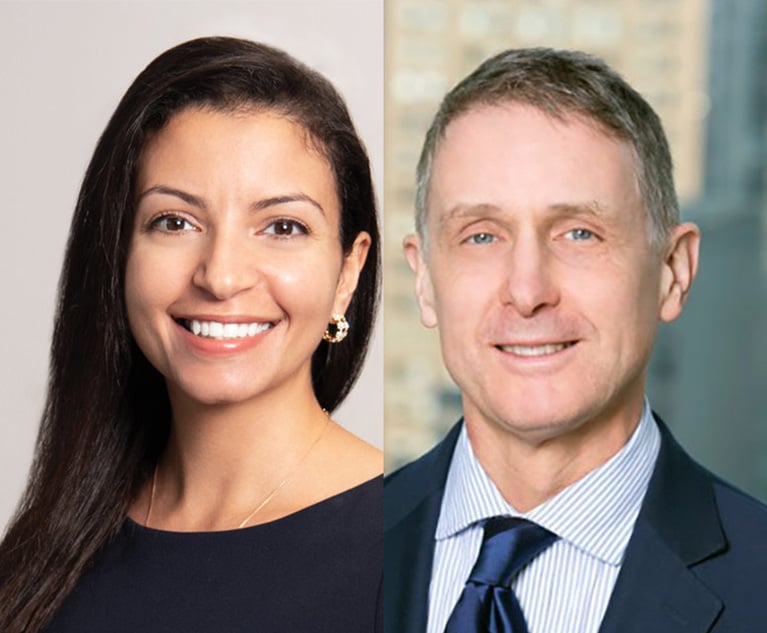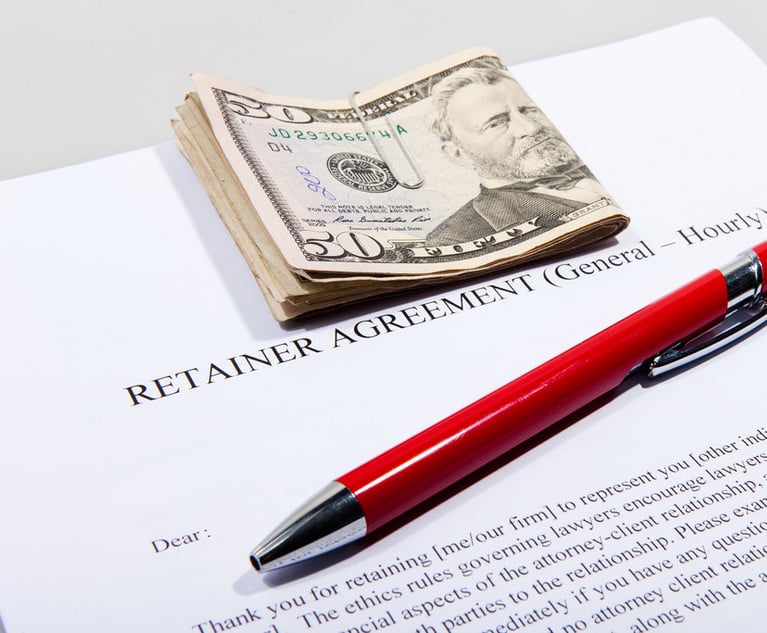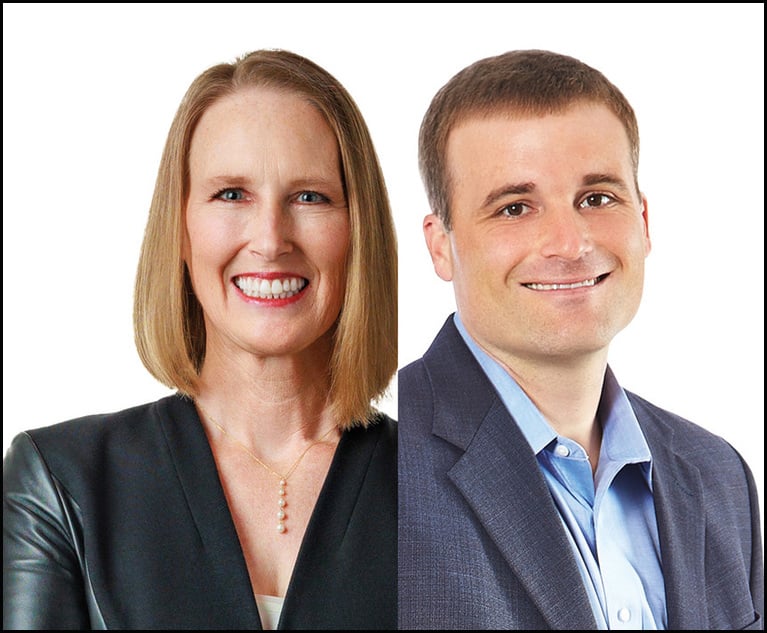Attorney of the Year Nominee: Sean J. Young
“I've enjoyed working with government officials of all parties. I don't want to work with just one party,” Sean Young said. “I really believe our issues are nonpartisan.”
June 19, 2019 at 02:00 PM
4 minute read
 Sean J. Young, ACLU of Georgia (Photo: John Disney/ALM)
Sean J. Young, ACLU of Georgia (Photo: John Disney/ALM)
Sean J. Young, 39, is one of the key lawyers behind the headlines of the frenzy of election litigation in Georgia during the past year.
When Young came to Atlanta in 2017 as legal director for the American Civil Liberties Union of Georgia, he was uniquely prepared for what lay ahead. Following his graduation from Yale Law School, he worked two stints with big firms in New York: first with Hughes Hubbard & Reed, then with Skadden, Arps, Slate, Meagher & Flom. He left each one for clerkships with federal judges—first in the Southern District of New York, then with the U.S. Court of Appeals for the Seventh Circuit.
During his time at Skadden, he did pro bono work that ultimately called him to practice public interest law. So, when he finished paying off his student loan debt, he volunteered full-time for the ACLU before going off to Chicago for his Seventh Circuit clerkship. After his yearlong term in Chicago, he returned to New York to work for the ACLU.
He spent the next 3½ years working with the New York-based ACLU Voting Rights Project, litigating cases around the country. He challenged Wisconsin's voter identification requirement, winning a ruling from the Seventh Circuit allowing an important exception for voters who have difficulty acquiring an ID. He fought Ohio's early voting cutbacks, leading the state to extend hours in all counties instead of just urban ones. The Sixth Circuit adopted the legal standard he proposed, and the Fourth and Fifth Circuits adopted it in reliance on the Sixth Circuit's decision.
Then he came to Georgia just in time for the historically contentious 2018 election season in which a white male Republican sitting secretary of state, Brian Kemp, presided over his own election as governor, beating an African American Democratic woman, Stacey Abrams.
Young filed lawsuits and demand letters that reversed the closing of polling places in predominantly African American communities in the South Georgia counties of Randolph and Irwin and the state's most urban county, Fulton.
Young's team secured an injunction to prevent the secretary of state from rejecting absentee ballots with mismatched signatures—meaning they were signed with different initials or versions of the same name. The secretary of state asked the Eleventh Circuit to stay that injunction. The court declined. The ruling came a week before the election.
Sophia Lakin, staff attorney with the ACLU's Voting Rights Project in New York, called the Eleventh Circuit ruling “a huge victory, especially with the midterms just days away.”
Andrea Young, executive director of the ACLU of Georgia, called Young “hands down the best voting rights lawyer in Georgia.” She estimated his work kept 150,000 people from being taken off the active voter rolls. But she also praised him as a champion of the First Amendment.
Through Young's efforts, protesters won the right to go inside the Georgia Capitol rather than being relegated to Liberty Plaza across the street, and they were permitted to carry signs with them—and wear messages on shirts and buttons. The result showed in local and national reports when Georgia passed its version of the “heartbeat bill” banning abortion after six weeks of pregnancy. The Capitol was filled with peaceful protesters bearing both anti-abortion and abortion-rights messages.
“I take our nonpartisanship status very seriously,” Young said. With First Amendment as with voting rights issues, he's working with everyone in mind.
“I don't care what political party I support,” he said. “Let them all vote.”
He's most proud of instances in which he's been able to move opposing parties to common ground—sometimes without a lawsuit but with a demand letter or just a conversation.
“I've enjoyed working with government officials of all parties. I don't want to work with just one party,” Young said. “I really believe our issues are nonpartisan.”
Earlier this year, Young went to a public meeting in a town south of Atlanta to speak against a proposed ordinance that would have allowed the city to sue citizens for defamation if they criticized their government officials. The mayor introduced him to the crowd, which booed “mightily” at the mention of the ACLU.
“But as soon as I explained the ordinance was a violation of the First Amendment, the crowd cheered,” Young said. “People were coming to me afterward saying, 'This is the first time in my life I ever agreed with the ACLU.'”
His answer: “I'm saying I think we agree on more than you might realize.”
This content has been archived. It is available through our partners, LexisNexis® and Bloomberg Law.
To view this content, please continue to their sites.
Not a Lexis Subscriber?
Subscribe Now
Not a Bloomberg Law Subscriber?
Subscribe Now
NOT FOR REPRINT
© 2025 ALM Global, LLC, All Rights Reserved. Request academic re-use from www.copyright.com. All other uses, submit a request to [email protected]. For more information visit Asset & Logo Licensing.
You Might Like
View All
On The Move: Energy Infrastructure Pro Joins Moore & Van Allen, Adams & Reese Changes Atlanta Leadership
6 minute read
40% Contingency: A New Ruling Just Cost This Plaintiff Team $827K in Legal Fees
6 minute read

'David and Goliath' Dispute Between Software Developers Ends in $24M Settlement
Trending Stories
- 1Attorney Sanctioned $9K for Revealing Nude Photos, Other Info in Court Filing
- 2Shifting Battlegrounds in Administrative Law, From Biden to Trump II
- 3Bar Report - Jan. 13
- 4Newsmakers: Robert Collins, Barron Wallace Elected to Bracewell’s Management Committee
- 5Navigating the Shifting Sands of E-Discovery and Information Governance in 2025
Who Got The Work
Michael G. Bongiorno, Andrew Scott Dulberg and Elizabeth E. Driscoll from Wilmer Cutler Pickering Hale and Dorr have stepped in to represent Symbotic Inc., an A.I.-enabled technology platform that focuses on increasing supply chain efficiency, and other defendants in a pending shareholder derivative lawsuit. The case, filed Oct. 2 in Massachusetts District Court by the Brown Law Firm on behalf of Stephen Austen, accuses certain officers and directors of misleading investors in regard to Symbotic's potential for margin growth by failing to disclose that the company was not equipped to timely deploy its systems or manage expenses through project delays. The case, assigned to U.S. District Judge Nathaniel M. Gorton, is 1:24-cv-12522, Austen v. Cohen et al.
Who Got The Work
Edmund Polubinski and Marie Killmond of Davis Polk & Wardwell have entered appearances for data platform software development company MongoDB and other defendants in a pending shareholder derivative lawsuit. The action, filed Oct. 7 in New York Southern District Court by the Brown Law Firm, accuses the company's directors and/or officers of falsely expressing confidence in the company’s restructuring of its sales incentive plan and downplaying the severity of decreases in its upfront commitments. The case is 1:24-cv-07594, Roy v. Ittycheria et al.
Who Got The Work
Amy O. Bruchs and Kurt F. Ellison of Michael Best & Friedrich have entered appearances for Epic Systems Corp. in a pending employment discrimination lawsuit. The suit was filed Sept. 7 in Wisconsin Western District Court by Levine Eisberner LLC and Siri & Glimstad on behalf of a project manager who claims that he was wrongfully terminated after applying for a religious exemption to the defendant's COVID-19 vaccine mandate. The case, assigned to U.S. Magistrate Judge Anita Marie Boor, is 3:24-cv-00630, Secker, Nathan v. Epic Systems Corporation.
Who Got The Work
David X. Sullivan, Thomas J. Finn and Gregory A. Hall from McCarter & English have entered appearances for Sunrun Installation Services in a pending civil rights lawsuit. The complaint was filed Sept. 4 in Connecticut District Court by attorney Robert M. Berke on behalf of former employee George Edward Steins, who was arrested and charged with employing an unregistered home improvement salesperson. The complaint alleges that had Sunrun informed the Connecticut Department of Consumer Protection that the plaintiff's employment had ended in 2017 and that he no longer held Sunrun's home improvement contractor license, he would not have been hit with charges, which were dismissed in May 2024. The case, assigned to U.S. District Judge Jeffrey A. Meyer, is 3:24-cv-01423, Steins v. Sunrun, Inc. et al.
Who Got The Work
Greenberg Traurig shareholder Joshua L. Raskin has entered an appearance for boohoo.com UK Ltd. in a pending patent infringement lawsuit. The suit, filed Sept. 3 in Texas Eastern District Court by Rozier Hardt McDonough on behalf of Alto Dynamics, asserts five patents related to an online shopping platform. The case, assigned to U.S. District Judge Rodney Gilstrap, is 2:24-cv-00719, Alto Dynamics, LLC v. boohoo.com UK Limited.
Featured Firms
Law Offices of Gary Martin Hays & Associates, P.C.
(470) 294-1674
Law Offices of Mark E. Salomone
(857) 444-6468
Smith & Hassler
(713) 739-1250






